消失的职业
消失的100种职业
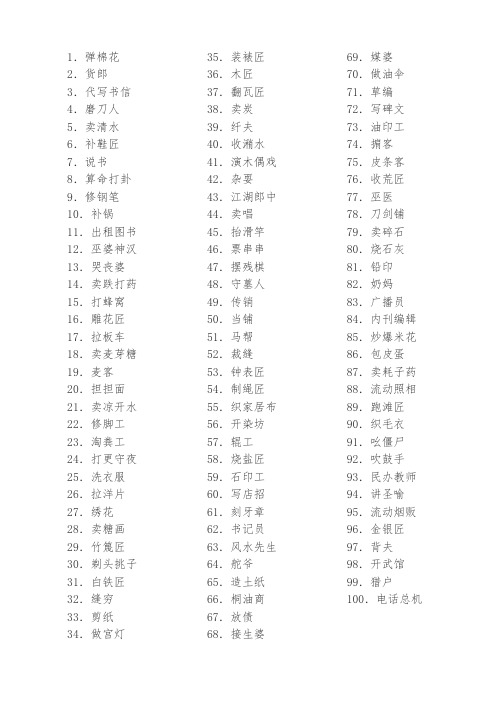
1.弹棉花2.货郎3.代写书信4.磨刀人5.卖清水6.补鞋匠7.说书8.算命打卦9.修钢笔10.补锅11.出租图书12.巫婆神汉13.哭丧婆14.卖跌打药15.打蜂窝16.雕花匠17.拉板车18.卖麦芽糖19.麦客20.担担面21.卖凉开水22.修脚工23.淘粪工24.打更守夜25.洗衣服26.拉洋片27.绣花28.卖糖画29.竹篾匠30.剃头挑子31.白铁匠32.缝穷33.剪纸34.做宫灯35.装裱匠36.木匠37.翻瓦匠38.卖炭39.纤夫40.收潲水41.演木偶戏42.杂耍43.江湖郎中44.卖唱45.抬滑竿46.票串串47.摆残棋48.守墓人49.传销50.当铺51.马帮52.裁缝53.钟表匠54.制绳匠55.织家居布56.开染坊57.辊工58.烧盐匠59.石印工60.写店招61.刻牙章62.书记员63.风水先生64.舵爷65.造土纸66.桐油商67.放债68.接生婆69.媒婆70.做油伞71.草编72.写碑文73.油印工74.掮客75.皮条客76.收荒匠77.巫医78.刀剑铺79.卖碎石80.烧石灰81.铅印82.奶妈83.广播员84.内刊编辑85.炒爆米花86.包皮蛋87.卖耗子药88.流动照相89.跑滩匠90.织毛衣91.吆僵尸92.吹鼓手93.民办教师94.讲圣喻95.流动烟贩96.金银匠97.背夫98.开武馆99.猎户100.电话总机。
正在消失的职业和正在兴起的职业

一、修钢笔 修钢笔的利润一直很低,一来钢笔的价 格本来就便宜,二来使用者大都是莘莘学子,故而 修钢笔一直是一个比较清贫的职业。也因此,我们 只能在学校周围和乡镇上,还可以见到修笔人像笔 一般瘦削的身影…… • 二、补锅 补锅,以前是街道手工作坊的一门职业, 属集体性质,学徒三年,工资极其微薄。出师后, 处境才稍微有所改善。按锅的品种来决定 工程的不 同,例如,有专门补铁锅的,补搪瓷器皿的,补铝 锅水壶的,技术、火候各不相同。当然,大师傅是 可以“通吃”的,样样拿得起,放得下。但随着生 意的萧条,这些作坊入不敷出,在经济的浪潮下逐 渐分解为个体户的行当了。但不可否认的是,他们 的收入都增加了不少。
• •
电脑游戏设计师 在日本,游戏软件开发行业已经成为 青少年10大最向往的社会职业之一。这个 职业除了对编程具有高要求外,更需要有 出色的讲故事的能力和想像力。 • 心理咨询师 • 中国的心理咨询还停留在医院门诊的 水平,出了大问题才想到它。而做心理咨 询应该是成为一个更加普遍的行为,就像 去一次酒吧那样。
• • • •
• •
• •
软件工程师 有数字表明,到2Fra bibliotek05年底,中国需要软件工 程师80万人,目前已经从业的软件工程师不到32 万人。软件行业是一个最需要超前意识的行业。 私人教练 无论是瘦身、网球,还是潜水项目,私人教 练除了是一个专业人士,同时还是一个很好的朋 友。 广告创意 中国的广告创意水平正在下降,但这正说明 了这个行业需要真正的人才。 旅游策划人 个性旅游的需求不断上扬,能开阔人们对于 旅游的想像力的策划人呼之欲出。
• 六、翻瓦匠 翻瓦,本只是一个泥水匠的小工序, 之所以发展成了一个职业,还是因为需求量较大 的市场促使的。但随着瓦片的使用率的降低,这 门职业越来越没市场了。 • 七、守墓人 对坟墓的敬重,体现在中国人的传统 伦理思想中,可以说是空前的。不要说皇家陵园 的威严和气势,单就是在民间,也是体现忠孝情 绪的关键所在。 • 八、收荒匠 收荒匠的嗓子一扯开就有山歌风味: “橘子皮牙膏皮兔皮破铜烂铁废纸旧书鸡毛鸭毛 鹅毛拿来卖——哟——”每隔三两分钟,他就唱一 次,唱得老太太小孩子心痒痒的,就开始在床下 门边找换钱的东西!
最后的神迹 职业 (2)
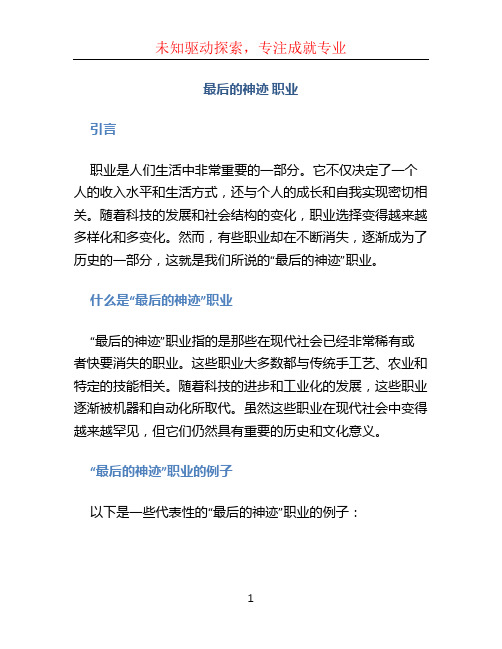
最后的神迹职业引言职业是人们生活中非常重要的一部分。
它不仅决定了一个人的收入水平和生活方式,还与个人的成长和自我实现密切相关。
随着科技的发展和社会结构的变化,职业选择变得越来越多样化和多变化。
然而,有些职业却在不断消失,逐渐成为了历史的一部分,这就是我们所说的“最后的神迹”职业。
什么是“最后的神迹”职业“最后的神迹”职业指的是那些在现代社会已经非常稀有或者快要消失的职业。
这些职业大多数都与传统手工艺、农业和特定的技能相关。
随着科技的进步和工业化的发展,这些职业逐渐被机器和自动化所取代。
虽然这些职业在现代社会中变得越来越罕见,但它们仍然具有重要的历史和文化意义。
“最后的神迹”职业的例子以下是一些代表性的“最后的神迹”职业的例子:纺织工在过去的几个世纪中,纺织工是一个非常重要的职业。
他们用手工或简单的机器将纤维制成纺织品。
然而,随着纺织业的工业化和自动化,纺织工的需求减少,许多纺织厂关闭,这使得纺织工成为了一个“最后的神迹”职业。
银匠银匠是一种古老的职业,专门从事银器的制作和修复。
他们熟练掌握银器的设计和加工工艺,制作出各种精美的银饰品。
然而,在现代社会中,银器的需求已经大大减少,许多人更倾向于使用便宜的塑料和合金制品,这使得银匠逐渐消失。
马车夫马车夫是驾驶马车的人,将人们和货物从一个地方运到另一个地方。
在过去,马车是主要的交通工具,马车夫是必不可少的。
但是随着汽车的发明和可用性的提高,马车夫的需求逐渐减少,这使得马车夫也成为了一个罕见的职业。
“最后的神迹”职业的影响“最后的神迹”职业的消失给我们带来了一些问题和影响。
首先,一些具有重要历史和文化价值的技能和知识可能会逐渐失传。
例如,银匠的技艺和纺织工的工艺可能会因为这些职业的消失而流失。
其次,许多人可能会失去他们的工作和经济来源。
这将给社会带来很大的压力,因为失业率可能会增加,经济不稳定性会增加。
最后,一些社区和地区的独特文化和特色可能会因为这些职业的消失而逐渐丧失。
行将消失的行业
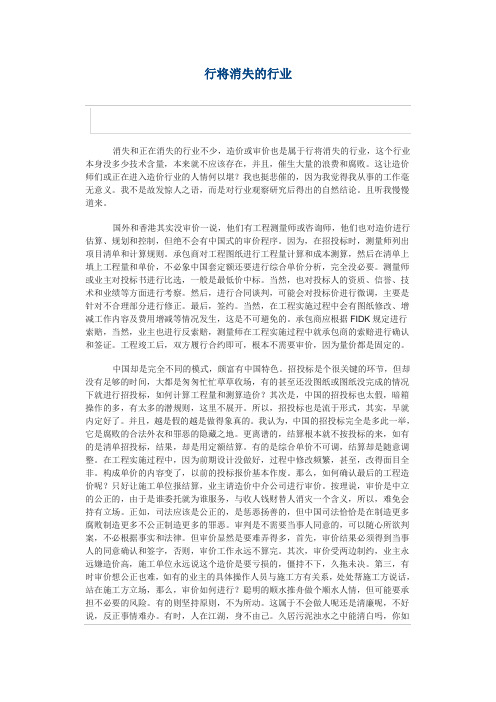
行将消失的行业消失和正在消失的行业不少,造价或审价也是属于行将消失的行业,这个行业本身没多少技术含量,本来就不应该存在,并且,催生大量的浪费和腐败。
这让造价师们或正在进入造价行业的人情何以堪?我也挺悲催的,因为我觉得我从事的工作毫无意义。
我不是故发惊人之语,而是对行业观察研究后得出的自然结论。
且听我慢慢道来。
国外和香港其实没审价一说,他们有工程测量师或咨询师,他们也对造价进行估算、规划和控制,但绝不会有中国式的审价程序。
因为,在招投标时,测量师列出项目清单和计算规则。
承包商对工程图纸进行工程量计算和成本测算,然后在清单上填上工程量和单价,不必象中国套定额还要进行综合单价分析,完全没必要。
测量师或业主对投标书进行比选,一般是最低价中标。
当然,也对投标人的资质、信誉、技术和业绩等方面进行考察。
然后,进行合同谈判,可能会对投标价进行微调,主要是针对不合理部分进行修正。
最后,签约。
当然,在工程实施过程中会有图纸修改、增减工作内容及费用增减等情况发生,这是不可避免的。
承包商应根据FIDK规定进行索赔,当然,业主也进行反索赔,测量师在工程实施过程中就承包商的索赔进行确认和签证。
工程竣工后,双方履行合约即可,根本不需要审价,因为量价都是固定的。
中国却是完全不同的模式,颇富有中国特色。
招投标是个很关键的环节,但却没有足够的时间,大都是匆匆忙忙草草收场,有的甚至还没图纸或图纸没完成的情况下就进行招投标,如何计算工程量和测算造价?其次是,中国的招投标也太假,暗箱操作的多,有太多的潜规则,这里不展开。
所以,招投标也是流于形式,其实,早就内定好了。
并且,越是假的越是做得象真的。
我认为,中国的招投标完全是多此一举,它是腐败的合法外衣和罪恶的隐藏之地。
更离谱的,结算根本就不按投标的来,如有的是清单招投标,结果,却是用定额结算。
有的是综合单价不可调,结算却是随意调整。
在工程实施过程中,因为前期设计没做好,过程中修改频繁,甚至,改得面目全非。
消失的100种职业
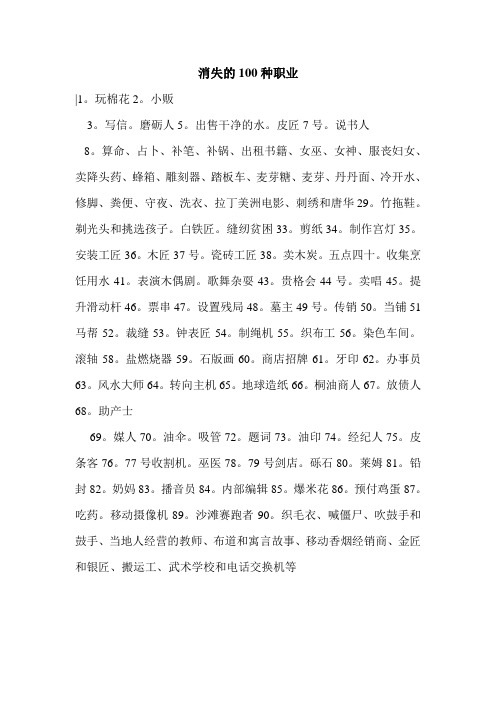
消失的100种职业|1。
玩棉花2。
小贩3。
写信。
磨砺人5。
出售干净的水。
皮匠7号。
说书人8。
算命、占卜、补笔、补锅、出租书籍、女巫、女神、服丧妇女、卖降头药、蜂箱、雕刻器、踏板车、麦芽糖、麦芽、丹丹面、冷开水、修脚、粪便、守夜、洗衣、拉丁美洲电影、刺绣和唐华29。
竹拖鞋。
剃光头和挑选孩子。
白铁匠。
缝纫贫困33。
剪纸34。
制作宫灯35。
安装工匠36。
木匠37号。
瓷砖工匠38。
卖木炭。
五点四十。
收集烹饪用水41。
表演木偶剧。
歌舞杂耍43。
贵格会44号。
卖唱45。
提升滑动杆46。
票串47。
设置残局48。
墓主49号。
传销50。
当铺51马帮52。
裁缝53。
钟表匠54。
制绳机55。
织布工56。
染色车间。
滚轴58。
盐燃烧器59。
石版画60。
商店招牌61。
牙印62。
办事员63。
风水大师64。
转向主机65。
地球造纸66。
桐油商人67。
放债人68。
助产士69。
媒人70。
油伞。
吸管72。
题词73。
油印74。
经纪人75。
皮条客76。
77号收割机。
巫医78。
79号剑店。
砾石80。
莱姆81。
铅封82。
奶妈83。
播音员84。
内部编辑85。
爆米花86。
预付鸡蛋87。
吃药。
移动摄像机89。
沙滩赛跑者90。
织毛衣、喊僵尸、吹鼓手和鼓手、当地人经营的教师、布道和寓言故事、移动香烟经销商、金匠和银匠、搬运工、武术学校和电话交换机等。
因时代变迁逐渐消失的十种职业
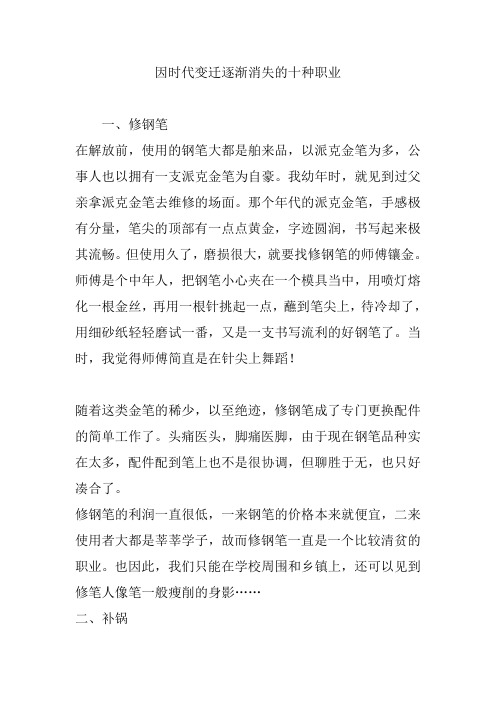
因时代变迁逐渐消失的十种职业一、修钢笔在解放前,使用的钢笔大都是舶来品,以派克金笔为多,公事人也以拥有一支派克金笔为自豪。
我幼年时,就见到过父亲拿派克金笔去维修的场面。
那个年代的派克金笔,手感极有分量,笔尖的顶部有一点点黄金,字迹圆润,书写起来极其流畅。
但使用久了,磨损很大,就要找修钢笔的师傅镶金。
师傅是个中年人,把钢笔小心夹在一个模具当中,用喷灯熔化一根金丝,再用一根针挑起一点,蘸到笔尖上,待冷却了,用细砂纸轻轻磨试一番,又是一支书写流利的好钢笔了。
当时,我觉得师傅简直是在针尖上舞蹈!随着这类金笔的稀少,以至绝迹,修钢笔成了专门更换配件的简单工作了。
头痛医头,脚痛医脚,由于现在钢笔品种实在太多,配件配到笔上也不是很协调,但聊胜于无,也只好凑合了。
修钢笔的利润一直很低,一来钢笔的价格本来就便宜,二来使用者大都是莘莘学子,故而修钢笔一直是一个比较清贫的职业。
也因此,我们只能在学校周围和乡镇上,还可以见到修笔人像笔一般瘦削的身影……二、补锅补锅,以前是街道手工作坊的一门职业,属集体性质,学徒三年,工资极其微薄。
出师后,处境才稍微有所改善。
按锅的品种来决定工程的不同,例如,有专门补铁锅的,补搪瓷器皿的,补铝锅水壶的,技术、火候各不相同。
当然,大师傅是可以“通吃”的,样样拿得起,放得下。
但随着生意的萧条,这些作坊入不敷出,在经济的浪潮下逐渐分解为个体户的行当了。
但不可否认的是,他们的收入都增加了不少。
一些补锅匠走街串户,悠悠是唱“补——锅——嘞——”嘹亮的嗓音绕梁不绝,惹得一帮婆婆媳妇忙着找出破锅烂碗,走在弄堂里,锅碗瓢盆一阵乱碰乱响,酷似一支五音不全的打击乐队,十分热闹。
有意思的是,把铝锅底换了,补锅匠还不让客人拿走,装一锅水,要看它漏不漏。
补锅匠信心十足:漏了,我一文钱不收!攒够了钱的补锅匠,才可望开一家小店,稳稳当当地吃起手艺饭。
而一些头脑灵活的补锅匠,又开始在琢磨修理高压锅、电炒锅或者电饭煲了。
正在消失的行业 职业特点
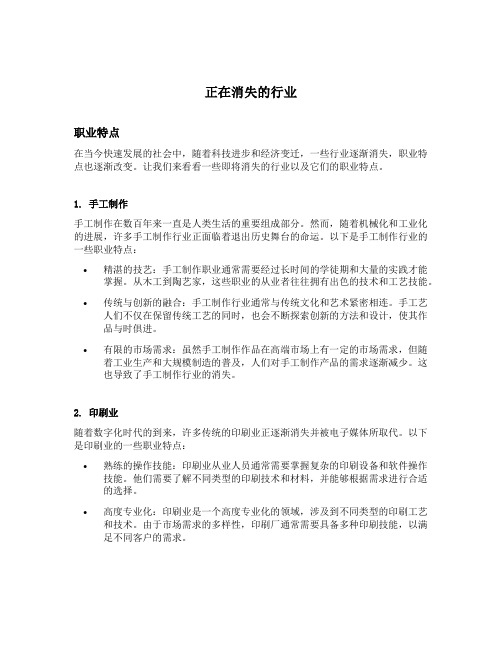
正在消失的行业职业特点在当今快速发展的社会中,随着科技进步和经济变迁,一些行业逐渐消失,职业特点也逐渐改变。
让我们来看看一些即将消失的行业以及它们的职业特点。
1. 手工制作手工制作在数百年来一直是人类生活的重要组成部分。
然而,随着机械化和工业化的进展,许多手工制作行业正面临着退出历史舞台的命运。
以下是手工制作行业的一些职业特点:•精湛的技艺:手工制作职业通常需要经过长时间的学徒期和大量的实践才能掌握。
从木工到陶艺家,这些职业的从业者往往拥有出色的技术和工艺技能。
•传统与创新的融合:手工制作行业通常与传统文化和艺术紧密相连。
手工艺人们不仅在保留传统工艺的同时,也会不断探索创新的方法和设计,使其作品与时俱进。
•有限的市场需求:虽然手工制作作品在高端市场上有一定的市场需求,但随着工业生产和大规模制造的普及,人们对手工制作产品的需求逐渐减少。
这也导致了手工制作行业的消失。
2. 印刷业随着数字化时代的到来,许多传统的印刷业正逐渐消失并被电子媒体所取代。
以下是印刷业的一些职业特点:•熟练的操作技能:印刷业从业人员通常需要掌握复杂的印刷设备和软件操作技能。
他们需要了解不同类型的印刷技术和材料,并能够根据需求进行合适的选择。
•高度专业化:印刷业是一个高度专业化的领域,涉及到不同类型的印刷工艺和技术。
由于市场需求的多样性,印刷厂通常需要具备多种印刷技能,以满足不同客户的需求。
•数字化转型:虽然印刷业正面临消失的危机,但一些公司已经开始转型,通过数字化技术来扩大业务范围。
例如,一些印刷公司开始提供在线设计和个性化印刷服务,以适应不断变化的市场需求。
3. 纺织业纺织业是一个历史悠久的行业,但随着全球化和工业化的加速发展,一些传统的纺织业正面临衰落。
以下是纺织业的一些职业特点:•劳动密集型工作:纺织业是一个劳动密集型的行业,需要大量的人力来进行布料纺织、染色和缝制等工作。
然而,随着自动化和机械化的引入,一些传统的纺织工作逐渐被机器所取代。
过去十年消失的职业英语作文

Vanishing Professions in the Last Decade: AGlobal PhenomenonIn the rapidly evolving world, the last decade has witnessed a remarkable transformation in various industries, leading to the disappearance of numerous professions that were once considered staples of society. This phenomenon is not confined to any particular region or culture, but is a global trend that has affected people across the globe.One of the most significant professions that have vanished in the past ten years is the typewriter repairman. With the advent of digital technology and the widespreaduse of computers and smartphones, typewriters have become obsolete, rendering the skills of typewriter repairmen obsolete as well. Similarly, the job of the film processor, who used to develop and print photos, has also disappeared, as most people now prefer to capture and share their moments digitally.Another profession that has vanished in recent years is the telephone operator. In the era before direct dialing, telephone operators played a crucial role in connecting callers to their desired destinations. However, with theadvent of automated dialing systems and the widespread use of mobile phones, the need for human operators has diminished significantly.The rise of online retail has also led to the disappearance of many traditional retail jobs. Brick-and-mortar stores are closing down, and even those that remain are often staffed by fewer employees due to automation and self-checkout systems. This trend has been particularly hard on cashiers, sales clerks, and other retail workers who have lost their jobs due to automation and online competition.The decline of the manufacturing industry has also contributed to the disappearance of numerous professions. Factory workers, machinists, and other manufacturing roles have become less common as companies automate their production processes and outsource manufacturing to cheaper labor markets.Moreover, the rise of artificial intelligence (AI) and machine learning has led to the automation of many white-collar jobs. Data entry clerks, accountants, and even someprogramming roles are now being performed by machines, reducing the need for human employees.The disappearance of these professions has had profound impacts on society. It has led to job losses and economic instability for many individuals and families. However, it has also created new opportunities and careers in emerging industries such as technology, healthcare, and green energy. In conclusion, the last decade has seen the disappearance of many professions due to technological advancements and changing industry landscapes. While this has brought about significant challenges, it has also presented new opportunities for growth and innovation. Aswe move forward, it is important to adapt to these changes and prepare for the future of work.**过去十年消失的职业:全球现象**在快速发展的世界中,过去十年见证了各行业的显著变革,导致许多一度被认为是社会支柱的职业逐渐消失。
未来即将消失的职业
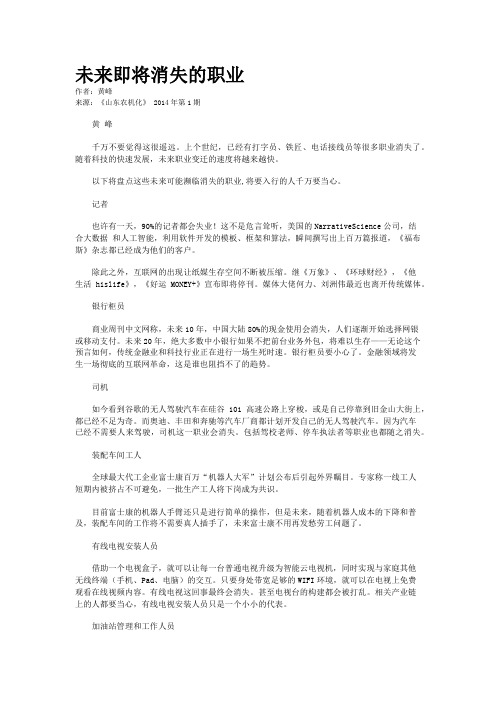
未来即将消失的职业作者:黄峰来源:《山东农机化》 2014年第1期黄峰千万不要觉得这很遥远。
上个世纪,已经有打字员、铁匠、电话接线员等很多职业消失了。
随着科技的快速发展,未来职业变迁的速度将越来越快。
以下将盘点这些未来可能濒临消失的职业,将要入行的人千万要当心。
记者也许有一天,90%的记者都会失业!这不是危言耸听,美国的NarrativeScience公司,结合大数据和人工智能,利用软件开发的模板、框架和算法,瞬间撰写出上百万篇报道,《福布斯》杂志都已经成为他们的客户。
除此之外,互联网的出现让纸媒生存空间不断被压缩。
继《万象》、《环球财经》,《他生活hislife》,《好运MONEY+》宣布即将停刊。
媒体大佬何力、刘洲伟最近也离开传统媒体。
银行柜员商业周刊中文网称,未来10年,中国大陆80%的现金使用会消失,人们逐渐开始选择网银或移动支付。
未来20年,绝大多数中小银行如果不把前台业务外包,将难以生存——无论这个预言如何,传统金融业和科技行业正在进行一场生死时速。
银行柜员要小心了。
金融领域将发生一场彻底的互联网革命,这是谁也阻挡不了的趋势。
司机如今看到谷歌的无人驾驶汽车在硅谷101高速公路上穿梭,或是自己停靠到旧金山大街上,都已经不足为奇。
而奥迪、丰田和奔驰等汽车厂商都计划开发自己的无人驾驶汽车。
因为汽车已经不需要人来驾驶,司机这一职业会消失。
包括驾校老师、停车执法者等职业也都随之消失。
装配车间工人全球最大代工企业富士康百万“机器人大军”计划公布后引起外界瞩目。
专家称一线工人短期内被挤占不可避免,一批生产工人将下岗成为共识。
目前富士康的机器人手臂还只是进行简单的操作,但是未来,随着机器人成本的下降和普及,装配车间的工作将不需要真人插手了,未来富士康不用再发愁劳工问题了。
有线电视安装人员借助一个电视盒子,就可以让每一台普通电视升级为智能云电视机,同时实现与家庭其他无线终端(手机、Pad、电脑)的交互。
未来即将消失的职业英语作文
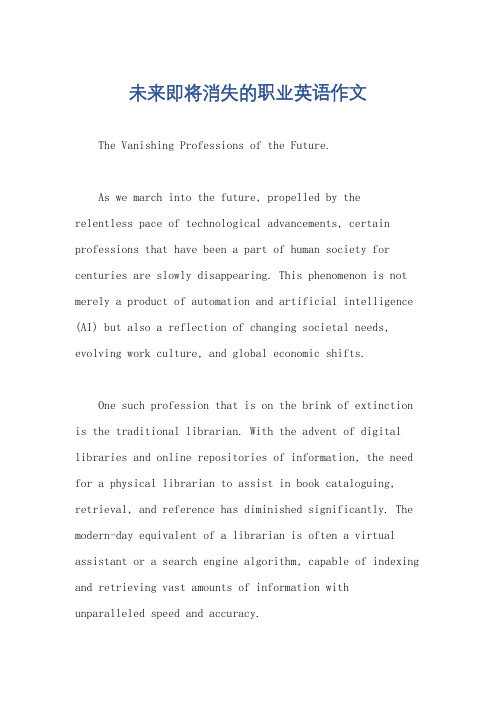
未来即将消失的职业英语作文The Vanishing Professions of the Future.As we march into the future, propelled by therelentless pace of technological advancements, certain professions that have been a part of human society for centuries are slowly disappearing. This phenomenon is not merely a product of automation and artificial intelligence (AI) but also a reflection of changing societal needs, evolving work culture, and global economic shifts.One such profession that is on the brink of extinction is the traditional librarian. With the advent of digital libraries and online repositories of information, the need for a physical librarian to assist in book cataloguing, retrieval, and reference has diminished significantly. The modern-day equivalent of a librarian is often a virtual assistant or a search engine algorithm, capable of indexing and retrieving vast amounts of information with unparalleled speed and accuracy.Another profession that is slowly fading away is the typist. In the pre-digital era, typists were essential for transcribing handwritten documents into typed form. However, with the widespread use of computers and smartphones,typing has become a基本技能 that most individuals possess. The advent of voice recognition software has further diminished the need for typists, as it can convert spoken words into text with remarkable accuracy.The rise of automation and robotics has also led to the decline of many manufacturing-related professions. Factory workers, who once toiled tirelessly on the assembly lines, are now being replaced by machines that can perform the same tasks with greater efficiency and precision. Whilethis shift has led to increased productivity and cost savings for manufacturers, it has also resulted insignificant job losses for those who depended on manuallabor for their livelihoods.The travel agent, a once-revered figure in the tourism industry, is also facing extinction. With the proliferationof online travel booking platforms and apps, individuals can now plan and book their own vacations with ease, eliminating the need for a middleman. These platforms provide real-time updates on flights, hotels, and attractions, allowing travelers to make informed decisions without having to rely on a travel agent's expertise.The banking sector has also seen a significant reduction in the number of physical bank tellers. As more and more people adopt digital banking and mobile payment solutions, the need for physical tellers to process transactions and provide customer service has decreased. Automated teller machines (ATMs) and virtual assistants handle most of the transactional work, while customers can access their accounts and perform transactions remotely using smartphones or computers.The disappearance of these professions does not necessarily signify a negative outcome. In fact, it often leads to the emergence of new, more fulfilling career opportunities. For instance, while the traditional librarian may be disappearing, the demand for informationscientists and data analysts is on the rise. Similarly, while factory workers may be losing their jobs to automation, there is a growing demand for skilled workers in fields like robotics, AI, and data analytics.Moreover, the decline of certain professions also forces individuals to reevaluate their skill sets and pursue further education or training to adapt to the changing job market. This, in turn, leads to a more skilled and diverse workforce that is better equipped to handle the challenges of the future.In conclusion, while the disappearance of certain professions may seem like a cause for concern, it is actually a natural evolution of the job market. As technology continues to advance and societal needs change, new professions will emerge to replace those that have become obsolete. It is important for us to embrace this change, adapt to new trends, and prepare ourselves for the opportunities and challenges that lie ahead.。
未来即将消失的职业英语作文

未来即将消失的职业英语作文{z}In the future, many occupations that exist today may disappear due to technological advancements and changes in society.This essay will explore some of the jobs that are at risk of becoming obsolete and discuss the implications of these changes.One occupation that is likely to disappear is the traditional manufacturing worker.With the rise of automation and robotics, factories are increasingly using machines to perform tasks that were once done by humans.As a result, jobs in industries such as automotive manufacturing, textiles, and electronics may become scarce.Another profession that is at risk of disappearing is the printed newspaper journalist.As more people consume news online, the demand for traditional print media is decreasing.This shift means that jobs in newspapers and magazines may become obsolete, unless they can adapt to the digital age.Additionally, the role of the travel agent is also likely to diminish.With the rise of online booking platforms and apps, people can easily plan and book their own vacations without the need for a travel agent.This has led to a decline in the number of people working in the travel industry.However, while some occupations may disappear, new jobs will also be created by technological advancements.For example, careers in artificial intelligence, data analysis, and cybersecurity are expected togrow significantly in the coming years.These fields require specialized skills and knowledge, and individuals who can adapt and learn new technologies will be in high demand.In conclusion, the future is likely to see many occupations disappear due to technological advancements and changes in society.Jobs in manufacturing, journalism, and the travel industry may become obsolete, unless individuals can adapt and learn new skills.However, new opportunities will also arise, particularly in fields such as artificial intelligence and cybersecurity.It is important for people to stay informed about these changes and to continue learning and developing their skills to remain relevant in the workforce of the future.。
中国正在消失的职业(英语作文)
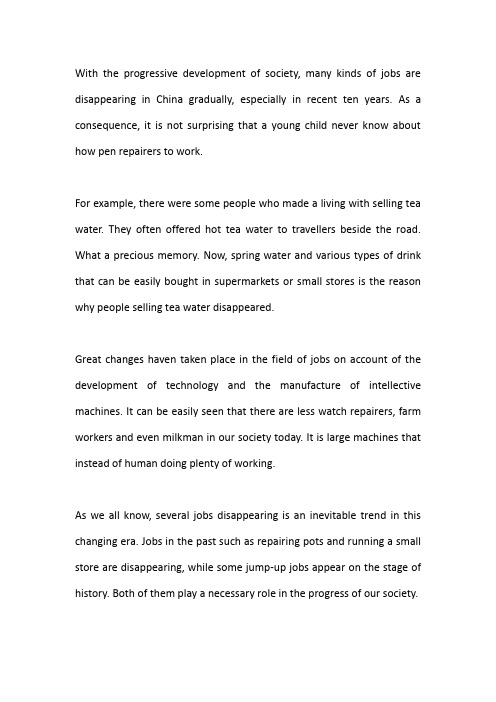
With the progressive development of society, many kinds of jobs are disappearing in China gradually, especially in recent ten years. As a consequence, it is not surprising that a young child never know about how pen repairers to work.For example, there were some people who made a living with selling tea water. They often offered hot tea water to travellers beside the road. What a precious memory. Now, spring water and various types of drink that can be easily bought in supermarkets or small stores is the reason why people selling tea water disappeared.Great changes haven taken place in the field of jobs on account of the development of technology and the manufacture of intellective machines. It can be easily seen that there are less watch repairers, farm workers and even milkman in our society today. It is large machines that instead of human doing plenty of working.As we all know, several jobs disappearing is an inevitable trend in this changing era. Jobs in the past such as repairing pots and running a small store are disappearing, while some jump-up jobs appear on the stage of history. Both of them play a necessary role in the progress of our society.。
消失的职业回忆散文:瓦匠师傅
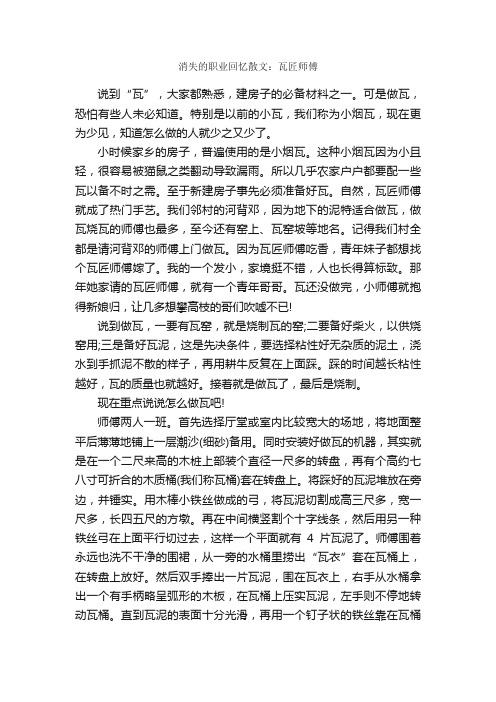
消失的职业回忆散文:瓦匠师傅说到“瓦”,大家都熟悉,建房子的必备材料之一。
可是做瓦,恐怕有些人未必知道。
特别是以前的小瓦,我们称为小烟瓦,现在更为少见,知道怎么做的人就少之又少了。
小时候家乡的房子,普遍使用的是小烟瓦。
这种小烟瓦因为小且轻,很容易被猫鼠之类翻动导致漏雨。
所以几乎农家户户都要配一些瓦以备不时之需。
至于新建房子事先必须准备好瓦。
自然,瓦匠师傅就成了热门手艺。
我们邻村的河背邓,因为地下的泥特适合做瓦,做瓦烧瓦的师傅也最多,至今还有窑上、瓦窑坡等地名。
记得我们村全都是请河背邓的师傅上门做瓦。
因为瓦匠师傅吃香,青年妹子都想找个瓦匠师傅嫁了。
我的一个发小,家境挺不错,人也长得算标致。
那年她家请的瓦匠师傅,就有一个青年哥哥。
瓦还没做完,小师傅就抱得新娘归,让几多想攀高枝的哥们吹嘘不已!说到做瓦,一要有瓦窑,就是烧制瓦的窑;二要备好柴火,以供烧窑用;三是备好瓦泥,这是先决条件,要选择粘性好无杂质的泥土,浇水到手抓泥不散的样子,再用耕牛反复在上面踩。
踩的时间越长粘性越好,瓦的质量也就越好。
接着就是做瓦了,最后是烧制。
现在重点说说怎么做瓦吧!师傅两人一班。
首先选择厅堂或室内比较宽大的场地,将地面整平后薄薄地铺上一层潮沙(细砂)备用。
同时安装好做瓦的机器,其实就是在一个二尺来高的木桩上部装个直径一尺多的转盘,再有个高约七八寸可折合的木质桶(我们称瓦桶)套在转盘上。
将踩好的瓦泥堆放在旁边,并锤实。
用木棒小铁丝做成的弓,将瓦泥切割成高三尺多,宽一尺多,长四五尺的方墩。
再在中间横竖割个十字线条,然后用另一种铁丝弓在上面平行切过去,这样一个平面就有4片瓦泥了。
师傅围着永远也洗不干净的围裙,从一旁的水桶里捞出“瓦衣”套在瓦桶上,在转盘上放好。
然后双手捧出一片瓦泥,围在瓦衣上,右手从水桶拿出一个有手柄略呈弧形的木板,在瓦桶上压实瓦泥,左手则不停地转动瓦桶。
直到瓦泥的表面十分光滑,再用一个钉子状的铁丝靠在瓦桶顶部,转动瓦桶,将顶部的瓦泥切割整齐后,提出瓦桶,放在早已铺好细砂的地面上,轻轻地将瓦桶合拢,连同瓦衣一起取出,一个圆圈的瓦坯就留在了地面上。
过去十年消失的职业英语作文
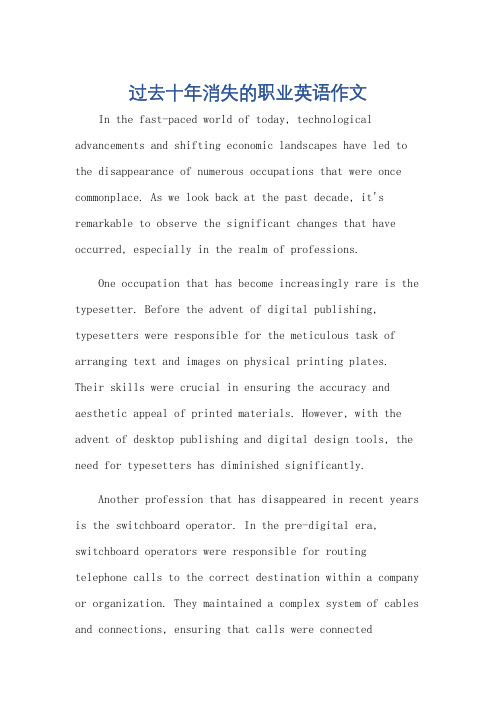
过去十年消失的职业英语作文In the fast-paced world of today, technological advancements and shifting economic landscapes have led to the disappearance of numerous occupations that were once commonplace. As we look back at the past decade, it's remarkable to observe the significant changes that have occurred, especially in the realm of professions.One occupation that has become increasingly rare is the typesetter. Before the advent of digital publishing, typesetters were responsible for the meticulous task of arranging text and images on physical printing plates. Their skills were crucial in ensuring the accuracy and aesthetic appeal of printed materials. However, with the advent of desktop publishing and digital design tools, the need for typesetters has diminished significantly.Another profession that has disappeared in recent years is the switchboard operator. In the pre-digital era, switchboard operators were responsible for routing telephone calls to the correct destination within a company or organization. They maintained a complex system of cables and connections, ensuring that calls were connectedefficiently. However, with the widespread adoption of digital phones and automated call routing systems, the role of the switchboard operator has become obsolete.The rise of automation and robotics has also led to the disappearance of many manufacturing jobs. Factory workers, once the backbone of the manufacturing industry, are now being replaced by machines that can perform tasks more efficiently and with less error. While this technological shift has led to increased productivity, it has also resulted in significant job losses in the manufacturing sector.The film processor is another profession that has vanished in recent years. Before the advent of digital photography, film processors were essential in the photography industry. They developed and printed the physical photographs taken by photographers. However, with the widespread adoption of digital cameras and online photo printing services, the need for film processors has dwindled.The music store clerk is another occupation that has been impacted by technological advancements. In the past,music store clerks were responsible for helping customers select and purchase music, whether it was physical albums or sheet music. However, with the rise of online streaming services and digital downloads, the need for physical music stores and their clerks has decreased significantly.The travel agent, once a fixture in the tourism industry, has also become less common. Travel agents were responsible for booking travel arrangements, such as flights, hotels, and tours, for their clients. However, with the advent of online travel booking platforms and mobile apps, customers can now make their own travel arrangements with ease, eliminating the need for travel agents in many cases.These are just a few examples of the many professions that have disappeared in the past decade. The changing economic landscape, technological advancements, andshifting consumer preferences have all contributed to the decline of these occupations. While these changes have brought about new opportunities and efficiencies, they have also left many individuals searching for new career paths.As we look ahead, it's important to recognize that the future of work is constantly evolving. New technologies and economic trends will continue to reshape the job market, leading to the emergence of new professions and the disappearance of others. It's crucial that we adapt tothese changes and prepare ourselves for the opportunities and challenges that lie ahead.**过去十年消失的职业**在当下快节奏的社会中,科技进步和不断变化的经济格局导致了许多曾经常见的职业逐渐消失。
2020年了,即将消逝的10种职业

2、银行柜员
• 商业周刊中文网称,未来10年,中国大陆 80%的现金使用会消失,人们逐渐开始选 择网银或移动支付。
• 12、 你瞧不起,看不见,不以为然的直销,现在正在以突飞猛进的 形式取代传统的营销模式。未来几十年将是直销业市场的天地,不看 学历、背景、能力的低门槛的创业方式,受到青睐,冲击着各大企业 的就业难问题。
• 也引来商界、演艺界的名媛富豪纷纷为自己准备人生备胎。
• 未来20年,绝大多数中小银行如果不把前 台业务外包,将难以生存——无论这个预 言如何,传统金融业和科技行业正在进行 一场生死时速。银行柜员要小心了。
• 金融领域将发生一场彻底的互联网革命, 这是谁也阻挡不了的趋势。
3、司机
• 如今看到谷歌的无人驾驶汽车在硅谷101高 速公路上穿梭,或是自己停靠到旧金山大 街上,都已经不足为奇。而奥迪、丰田和 奔驰等汽车厂商都计划开发自己的无人驾 驶汽车。
• 苏宁总算懂得翻个身子,好歹知道有人正在 打劫!而中国联通和中国移动,就实在是沉 睡难醒,毕竟牛了这么多年,加上是政府的 支持后盾,怎么都不相信,一个马化腾,就 可以在短短几个月内,直接开仓取钱!
• 一个微信软件的运用,在功能上足以把这两 个巨头在电话和短信的收费利用方面赶尽杀 绝!难怪现在急的跳脚,做出很没有水平的 举动,让“江湖大盗”马化腾,狠狠的嘲笑 了一番!醒来的速度不够快,就不用醒了, 免得伤心,直接送火葬场罢了!
• 可惜,大多数人到现在还在把那些所谓亿万富翁当回事, 在那里膜拜,却不知道,他们已经身心疲惫、头昏脑胀, 看不清前途,找不到归路!
消失的职业

的确,科技发展使通讯越来越快速便捷,不仅让寻呼机“下岗”,曾让人们依赖已久的电报业也急剧萎缩。
像修理钢笔、印刷厂里的排字工等这样的老行当,也同样在科技潮流的冲击下,逐渐从我们的生活中消失。
在经济高速增长的今天,职业结构变化频繁,旧职业被淘汰,新职业纷至沓来,这是不可逆转的历史潮流。
社会环境在造就新职业的同时,也迫使我们不得不打破长久以来的习惯思维,劳动者不是只有一辈子呆在某一个单位里才叫就业,人在一生中可能变换多种职业,关键要不断掌握新技能,与时俱进。
今天可能是寻呼小姐、照相师傅,明天就可能是地毯设计师、调查分析师、肥料配方师等。
而要跟上时代发展的脚步,只有学习、终身不断地学习,才是人们应对职业更替的最佳选择。
日前,劳动和社会保障部正式向社会发布“体育经纪人、照明设计师、咖啡师、调香师”等14个新职业,这也是我国发布的第六批新职业。
每一批新职业的发布,每一阶段职业结构的变化,都从一个侧面反映了我国产业结构的调整,以及经济社会的进步。
有数字显示,我国的旧职业已经消失了约3000个。
在国家公布每一批新职业的时候,我们不禁想到那些渐渐消失在人们视线中的旧职业:掏粪工在都市中隐身了,取代的是现代专业清洁工;在电脑没有普及时,抄写工也曾经是读书人的热门职业;补锅匠在城市里消失了,他们过去肩挑火炉和风箱,穿街走巷的吆喝还留在人们记忆当中;“赤脚医生”或者被正规医院“招安”或者退休;修钢笔的师傅,惟一的顾客是自己的小孙子;搬运站的脚夫,必须学会融入专业搬家公司的节奏中去……还有部分旧职业在“变脸”――“理发员”成了“美发师”,“炊事员”升级为“营养配餐师”,“保姆”称作“家政服务员”……这并非简单的称呼改变,它反映了传统职业内涵的丰富与提高,折射出经济、社会的发展进步。
寻呼小姐今已难寻BP机,曾经是人们最为值得炫耀的一种通讯工具,是身份与尊贵的象征。
一台汉字显示的寻呼机要4000多元,一年的服务费要600元。
在中国消失的职业英语作文

在中国消失的职业英语作文标题,The Disappearance of Traditional Occupations in China。
In recent years, China has undergone rapid industrialization and urbanization, leading to significant changes in its economic structure and employment landscape. Along with this transformation, traditional occupationsthat once thrived in the country are gradually disappearing. This essay aims to explore the reasons behind the disappearance of these occupations and its implications on Chinese society.One of the primary reasons for the decline oftraditional occupations in China is the advancement of technology. With the advent of automation anddigitalization, many manual labor-intensive jobs have been replaced by machines and computer algorithms. For example, the widespread use of machinery in agriculture has led to a decreased demand for agricultural laborers, such as farmhands and field workers. Similarly, the automation of manufacturing processes has resulted in the downsizing of labor-intensive industries, including textiles and handicrafts.Moreover, the shift towards a service-based economy has further marginalized traditional occupations. As China's economy becomes increasingly driven by consumer demand and innovation, there has been a growing emphasis on service-oriented industries such as finance, technology, and healthcare. Consequently, professions like blacksmithing, carpentry, and traditional medicine are no longer as economically viable as they once were. Many young people are now opting for careers in the service sector rather than pursuing traditional crafts and trades.Another factor contributing to the disappearance of traditional occupations is the migration of rural labor to urban areas. As more rural residents seek better employment opportunities and living standards in cities, there has been a significant exodus of labor from the countryside. This rural-to-urban migration has led to a decline inagricultural activities and traditional rural occupations. Many young people from rural backgrounds are reluctant to inherit their parents' professions, preferring instead to pursue urban jobs that offer higher wages and social mobility.Furthermore, changes in consumer preferences and lifestyles have also played a role in the decline of traditional occupations. With the rise of mass production and globalization, consumers now have access to a wide range of affordable goods and services from around the world. As a result, there is less demand for locally-made artisanal products and traditional craftsmanship. For example, handmade pottery and woven textiles, once prized for their quality and uniqueness, are now facing stiff competition from mass-produced alternatives.The disappearance of traditional occupations in China has significant implications for both individuals and society as a whole. On an individual level, many skilled artisans and craftsmen are facing economic hardship and social marginalization as their livelihoods vanish. Withoutviable alternatives, they may struggle to adapt to the changing economic landscape and find themselves trapped in poverty. Moreover, the loss of traditional occupations undermines cultural heritage and erodes the sense of identity and pride associated with these professions.From a societal perspective, the decline of traditional occupations exacerbates income inequality and regional disparities. As rural communities lose their primary sources of income, they become increasingly dependent on remittances from migrant workers and government assistance. This dependence perpetuates a cycle of poverty and underdevelopment in rural areas, widening the gap between urban and rural regions. Additionally, the loss of traditional skills and knowledge threatens to erode the cultural fabric of Chinese society, depriving future generations of valuable heritage and craftsmanship.In conclusion, the disappearance of traditional occupations in China is a multifaceted phenomenon driven by technological advancement, economic restructuring, and changing social dynamics. While these developments maycontribute to overall economic growth and modernization, they also pose significant challenges to individuals and communities reliant on traditional livelihoods. Efforts to preserve and revitalize traditional occupations are essential not only for preserving cultural heritage but also for promoting sustainable development and social inclusion in China.。
- 1、下载文档前请自行甄别文档内容的完整性,平台不提供额外的编辑、内容补充、找答案等附加服务。
- 2、"仅部分预览"的文档,不可在线预览部分如存在完整性等问题,可反馈申请退款(可完整预览的文档不适用该条件!)。
- 3、如文档侵犯您的权益,请联系客服反馈,我们会尽快为您处理(人工客服工作时间:9:00-18:30)。
那些在中国渐渐消失的职业任何事物由盛而衰都有一个过程,在历史中它可能只是瞬间,而在我们个人的经历之中,却可能是一个深刻的烙印,一段漫长的经历。
读以下的文字,看以下的图片,你可以把它当成一次消遣,也可以当成一次认识,也许它和你的思想能碰撞出一些什么。
消失职业之一:修钢笔在解放前,使用的钢笔大都是舶来品,以派克金笔为多,公事人也以拥有一支派克金笔为自豪。
我幼年时,就见到过父亲拿派克金笔去维修的场面。
那个年代的派克金笔,手感极有分量,笔尖的顶部有一点点黄金,字迹圆润,书写起来极其流畅。
但使用久了,磨损很大,就要找修钢笔的师傅镶金。
师傅是个中年人,把钢笔小心夹在一个模具当中,用喷灯熔化一根金丝,再用一根针挑起一点,蘸到笔尖上,待冷却了,用细砂纸轻轻磨试一番,又是一支书写流利的好钢笔了。
当时,我觉得师傅简直是在针尖上舞蹈!随着这类金笔的稀少,以至绝迹,修钢笔成了专门更换配件的简单工作了。
头痛医头,脚痛医脚,由于现在钢笔品种实在太多,配件配到笔上也不是很协调,但聊胜于无,也只好凑合了。
修钢笔的利润一直很低,一来钢笔的价格本来就便宜,二来使用者大都是莘莘学子,故而修钢笔一直是一个比较清贫的职业。
也因此,我们只能在学校周围和乡镇上,还可以见到修笔人像笔一般瘦削的身影……消失职业之二:补锅补锅,以前是街道手工作坊的一门职业,属集体性质,学徒三年,工资极其微薄。
出师后,处境才稍微有所改善。
按锅的品种来决定工程的不同,例如,有专门补铁锅的,补搪瓷器皿的,补铝锅水壶的,技术、火候各不相同。
当然,大师傅是可以“通吃”的,样样拿得起,放得下。
但随着生意的萧条,这些作坊入不敷出,在经济的浪潮下逐渐分解为个体户的行当了。
但不可否认的是,他们的收入都增加了不少。
一些补锅匠走街串户,悠悠是唱“补——锅——嘞——”嘹亮的嗓音绕梁不绝,惹得一帮婆婆媳妇忙着找出破锅烂碗,走在弄堂里,锅碗瓢盆一阵乱碰乱响,酷似一支五音不全的打击乐队,十分热闹。
有意思的是,把铝锅底换了,补锅匠还不让客人拿走,装一锅水,要看它漏不漏。
补锅匠信心十足:漏了,我一文钱不收!攒够了钱的补锅匠,才可望开一家小店,稳稳当当地吃起手艺饭。
而一些头脑灵活的补锅匠,又开始在琢磨修理高压锅、电炒锅或者电饭煲了。
时代在迫使每一个人前进,手艺人又怎么能够例外?消失职业之三:卖凉开水卖凉开水跟卖凉茶不是一回事。
在南方,卖凉开水的品种除凉茶外,还有糖水、白开水、西瓜汁、甘蔗汁等等,属于家庭妇女的求生之道。
要卖凉开水,必须得具备一个先天地利条件,自己的住宅就处在路边,不然的话,谁也不会为了这点小买卖去租房子的。
她们通常在门口摆一个桌子,有的也放上几条凳子,都使用玻璃杯子,倒好各种饮水,再用方玻璃片盖住杯口,以示卫生。
小孩都喜欢喝糖水和水果汁,但价格在当时也不低,一杯糖水收2分钱,一杯水果汁收5分钱。
有些卖水人十分狡诈,在玩针尖削铁的把戏,舍不得用白糖,而是用糖精代替,有时掌握不了分寸,全部变成了苦味,就会招来一片骂声。
喝凉茶的一般是成年人,而且以农村进城的人居多。
茶不是用的普通茶叶,而是用的老阴茶。
老阴茶是一种树叶,并非正规的茶叶,沸煮后,茶汁变成了红褐色,却能生津解渴。
这种茶如果是生了茶虫的,味道、功效会更好。
一杯凉茶大解暑,只收一分钱!现在想起来真让人难以置信。
不知什么时候,卖凉天水的摊子也卖起可乐、矿泉水、易拉罐来了,有的干脆全部瓶装饮料,外加香烟、糖果、卫生纸什么的,凉水摊子搞成杂货铺了。
在经济利益的驱使下,一杯凉水就能折射环境的变迁。
消失职业之四:剃头挑子剃头匠,俗称“待招”,南方一些城市喊走了调,都一律叫作“带带儿”,剃头匠也不好作解释,讲祖师爷在皇帝头上如何动手的业绩,好汉不提当年勇嘛。
剃头挑子一头热。
走街过巷的剃头匠都挑一副沉重的担子,有火炉、铁锅、竹椅、理发刀具、镜子以及自己吃饭的锅碗瓢盆和米面等,如果再有张席子,完全可以举行野外度假了。
只是这些剃头匠老实巴交,哪来这么古怪的念头?剃头匠只需对着弄堂里缓悠悠地喊一嗓子:“剪——头——哟——”,声震百十丈开外,老顾主们就动起来了。
理发讲缘分,有的剃头匠与某人的头发无缘,理出来的发型与长相很不相配,自然,这人的生意就永远别想了。
因而,每当一个陌生人来理发,剃头匠总是分外小心,力求留下好印象,蓄个长买主。
老顾主都是恋旧的,纷纷过来,围着剃头挑子摆起了龙门阵,剃头匠给大伙点头打招呼,就开始干活。
剃头匠的记忆很好,对客人可以做到不问什么,他能记住原来的要求。
理完发,舀来热水冲头,接着开始掏耳朵、修面。
为讨好顾主,剃头匠就拿出绝活,进行按摩。
睡落枕的脖子,寒食瘀积的腰背,剃头匠三招五式,简直是手到病除,还把颈椎、腰椎端得卡卡发响,看看顾主们,都舒服得鼻歪眼斜了,怎会不满意?剃头匠的收费标准,我知道起码有20年没变过。
只是到了20世纪90年代,才开始适应市场经济,一次也不过两三块钱,比起门面光鲜,宰刀锋利的理发店,剃头匠真是太不合时宜了。
消失职业之五:缝穷缝穷是北方话语,在南方就直接呼为“补衣服的”,听起来不好听,但人已经落魄到替人补破烂,是穷人在赚穷人的银子,也没有什么好听与否了。
从事缝穷的是些中老年妇女,劳动力逐渐丧失了,又不愿意成为家里的累赘,靠着多年来在针线上的修炼,赚点小菜钱而已。
到了这个份上,别人给多给少都随便,正因如此,来补衣服的多是些光棍汉,也乐得来这里,有个歇脚抽烟喝茶的时候。
在十几年前,还经常见到一些干下力活的汉子,裤子的屁股上补了两个整齐的大圆疤,这叫“补锅盔”,因为跟烧饼大小差不多。
往往是别的地方又烂了,但两“烧饼”仍然完好如初。
她们可以对钩坏的衣服进行织补,完全看不出来。
有篇小说,就写缝穷寡妇给一个汉子补衣服补出了感情的事,文笔清淡而执中,让人颇有伤感的印象。
这帮妇女平素也做些针线东西出卖,比如鞋垫、尿布、千层底布鞋、布袜子等等,都是用零碎布做出来的,但拼接合理,富于美感,扎实耐用,很受下层人的欢迎。
不知从什么时候起,缝穷已经改叫缝补匠了,她们除极小部分还在山村里,很大部分都到了城市的火车或汽车站里,在里面揽生意。
旅客衣服划破了,背包带子脱落,裤子拉链开裂,肯定要立即处理。
所以,缝补匠老在瞅别人的衣服和裤子,不知道的话,可能还以为是小偷呢。
消失职业之六:翻瓦匠翻瓦,本只是一个泥水匠的小工序,之所以发展成了一个职业,还是因为需求量较大的市场促使的。
过去,城市里平房很多,而且一般使用小青瓦,年代久了,尘土、枯枝树叶堵塞瓦沟,雨水倒灌瓦缝,或者瓦片碎裂了,就必须请翻瓦匠来翻瓦。
翻瓦匠多为三五个人一伙,分工细致,人人争先,进度往往出人意料,他们必须抢在天黑之前完成所有工作。
两人在房顶翻瓦,一人站在房檐边接,下面的就把瓦摆放整齐,另外一个人根据更换情况,去砖瓦窑买瓦。
待一座房顶瓦梁全部露出来,用扫帚清除掉杂物,再开始重新盖瓦。
盖好后,还要把瓦楞、屋檐重做,稍微讲究些的人家还要求翻瓦匠在瓦脊两头刻莲花、龙头。
大户豪宅更在瓦上塑些神话传说人物,这就不是翻瓦匠能够胜任的了。
瓦匠以石灰加剁断的麻筋作粘合剂,来处理房檐、枧水槽的缝口,比较坚固,一般一个晚上就干了。
翻瓦匠苦干一整天,主人一般要免费供应茶水、香烟,中午晚上两顿饭,然后再结算费用。
工价一般按房子的面积以及补的新瓦数量计算,泾渭分明,清白明晰。
这个时候,多是傍晚酒后,瓦匠在酒力的燃烧下,哼着一些小调或很流行的曲子,披着一身月光,工具在屁股上哐当哐当撞击,在很远的地方,声音仍是那么清晰……消失职业之七:守墓人对坟墓的敬重,体现在中国人的传统伦理思想中,可以说是空前的。
不要说皇家陵园的威严和气势,单就是在民间,也是体现忠孝情绪的关键所在。
一个家族,往往会把逝世的亲人埋葬在一个地方,既便于祭奠,又便于管理。
守墓人就是坟墓的最高权威。
守墓人多是与家族血缘远些的孤寡老者,黑衣黑裤,沉默而瘦削,也许长期在墓园吸纳朝雾和夕辉,总给人阴气弥漫的感觉。
守墓人的生活费用,均由家族供给,他主要的工作有两样,一是打扫墓园,清理杂草,种植花木;二是守夜,防止盗墓贼和野兽守墓人一般都是有神论者,对亡灵在周围的活动非常清楚,他充满敬畏地看待一切偶然的事件,诸如树木死亡、墓碑垮塌、长蛇显身、蚂蚁搬家等等,他就会迅速报经家族,然后进行妥善处理。
守墓人都是行善之人,对别人的请求,从不拒绝,倾力帮助,总坚信今生修行、来世有报答。
墓人有很多故事,如果他愿意开口,当代的很多文学家,就不需要胡编乱造贻笑老百姓了。
斗转星移,时代更替,墓园已经纳入政府的土地管理范畴,不得随意建造,浪费耕地。
守墓人连同那些墓园和几乎凝滞的时光,好像一并消失在历史的尘烟里了。
只是在起伏叠嶂的山区墓园里,守墓人的身影像《聊斋》中的人物,悄无声息地穿过黎明的梦境……消失职业之八:收荒匠收荒匠的嗓子一扯开就有山歌风味:“橘子皮牙膏皮兔皮破铜烂铁废纸旧书鸡毛鸭毛鹅毛拿来卖——哟——”每隔三两分钟,他就唱一次,唱得老太太小孩子心痒痒的,就开始在床下门边找换钱的东西!时间更早的收荒匠,并不是付钱的,而是以废旧物品来换东西。
什么东西呢?是锅、碗、盆、筷子、糖果、卷烟、白酒、草纸等等,百分之百的生活必需品。
他们通过门路,搞到这些处理品,再以物易物,实现商品的两次利差,就比纯粹付钱更划算。
在什么生活物品都需要票证的年代,老百姓首先就被琳琅满目的家什吸引住了,哪有收荒匠的鬼脑筋?常常是一幢宿舍,就把收荒匠的东西换光了。
收荒匠赚得钵满碗满,笑得露出一口黄牙,还得雇拖拉机来将破烂运走。
后来,随着生活的改善,老百姓明白了是怎么一回事,就拒绝收荒匠的处理品了,拿钱来!多么理直气壮。
收荒匠只好开始蘸着口水数钞票了。
他们身上全是1角2角5角的角票,摸出来一大摞,显示自己资源充足,实际上没多少,所以从没听说过收荒匠被抢的事。
其实呢,收荒匠经济处境都比较富裕,一般都修有楼房,装修得像收费公厕,这叫富不外露,他们永远是一副担子,穿着老土,奋力奔走在致富的康庄道路上。
现在,很多家庭居室豪华,破烂立即就扔了,还卖什么钱?收荒匠就到垃圾堆里寻宝,但每每又跟“垃圾王”发生争执!收荒匠跨行业了,就叫越俎代庖……消失职业之九:流动照相流动的照相师傅,从20世纪初就奔走在乡村与城市之间。
那此,这个人容易患蛊病,并开始语无伦次。
逐渐,照过相的人并无什么意外,关键是这张让人们惊喜的相片可以送给挚友情人,留下时光的形象和证据。
遍布城市里的照相馆,使摄影成了百姓生活中的一部分,而流动于山村的照相师傅,其实也是文明的传播者。
由于交通不便,师傅照完相,要隔两三周才会送来照片,让望眼欲穿的姑娘后生等得很不自在。
实在要快,办法只有一个:加钱!这就要师傅第二天再跑一趟!那个年代,照片上的颜色都是用颜料染的,姑娘看到自己鲜红的嘴唇和脸蛋,就很欢喜了。
